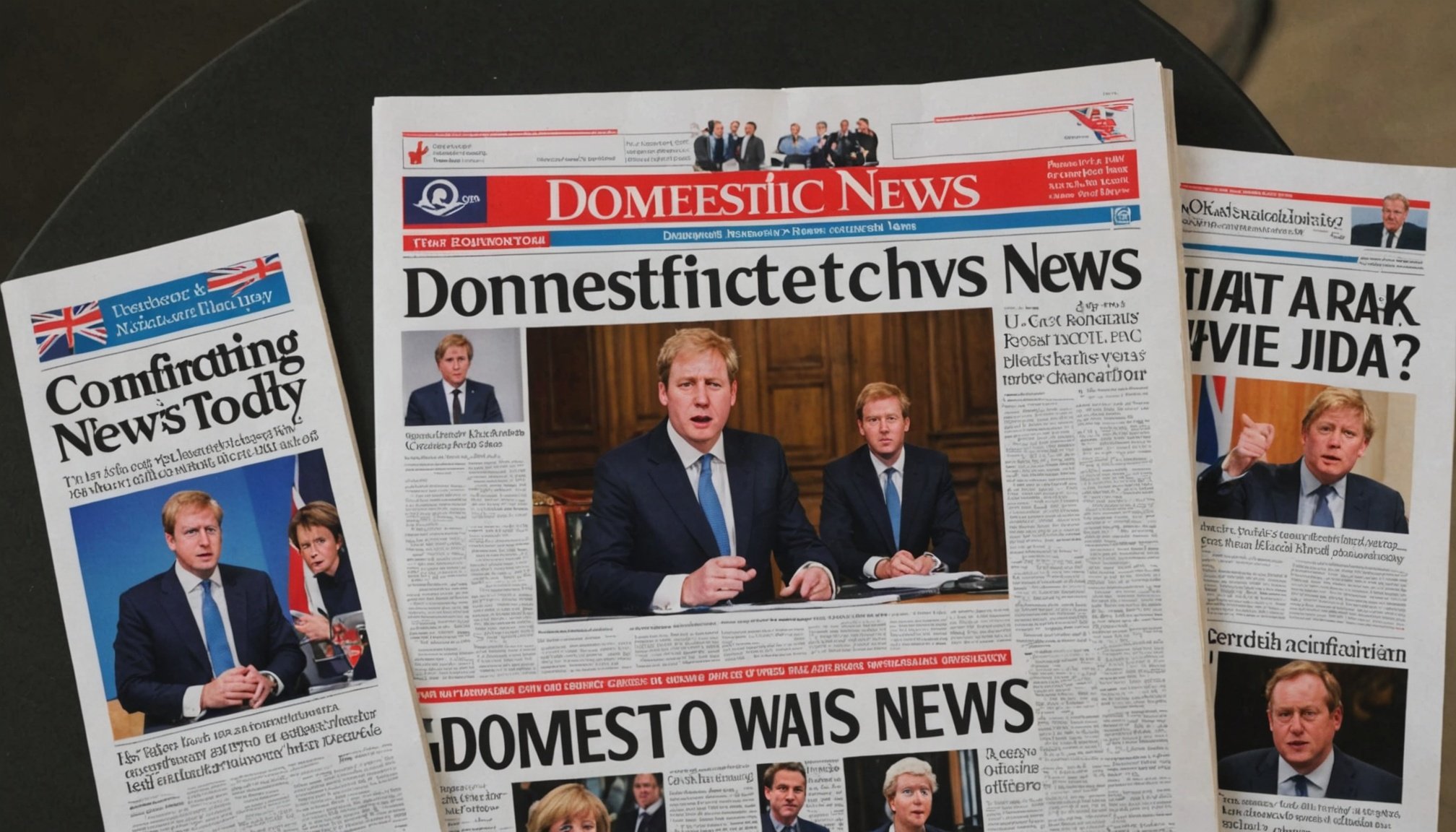Overview of Major Domestic Challenges in the UK
The UK domestic situation faces significant headwinds, prominently shaped by rising economic pressures and inflation. These factors have intensified cost-of-living concerns across households, affecting everything from energy bills to grocery shopping. Inflation remains a major cause of public unease, directly influencing debates in UK home news and local policy responses.
Another pressing national issue in the UK is political instability. Recent government decisions have fueled uncertainty, sparking debates on the future direction of domestic policies. Shifts in leadership and policy reversals have heightened scrutiny, impacting confidence both within political circles and among the general public.
Also read : How Might Britain’s Rural Communities Adapt to New Energy Policies?
Further complicating the scenario are ongoing public sector strikes. These disruptions affect essential services ranging from healthcare to transportation, amplifying frustrations. The strikes spotlight the tension between government austerity measures and workers’ demands, underscoring how major UK challenges are interconnected.
Together, inflation, political instability, and labor unrest create a complex web of challenges defining the current UK domestic situation—concerns frequently highlighted in UK home news as citizens and policymakers seek effective solutions.
Additional reading : How Do Recent UK Events Influence Homebuyers’ Decisions?
Economic Concerns and Inflation
The pressing issues behind price increases and household budgets
The UK is experiencing a notable surge in inflation rates, a challenge influencing every layer of society. Current figures from the Office for National Statistics (ONS) highlight that the cost of living in the UK is climbing at rates unseen in recent years, squeezing household budgets tighter. Economists express concern that persistent inflation could undermine economic stability and deepen inequality.
The rising prices of essentials such as food, energy, and housing disproportionately affect vulnerable populations. Many find daily expenses stretching their limits, forcing difficult choices like cutting back on nutritious meals or heating. This underlines the human impact beneath abstract numbers.
Inflation disrupts not just individual lives but broader economic dynamics. For example, reduced consumer spending due to higher costs can slow growth and complicate policy responses. Understanding these challenges is critical for fostering informed public discourse. Recognizing the pressures households face can guide effective decision-making to alleviate hardship while maintaining economic resilience.
Political Uncertainty and Policy Debates
Recent months in UK politics have been marked by significant government decisions and policy changes that reflect ongoing uncertainty. Several high-profile cabinet reshuffles have signaled shifts in priorities and strategies. These changes have fueled debates on how new policies will impact the country’s direction, especially amid economic challenges and social demands.
One of the most contentious issues continues to be the repercussions of Brexit. Discussions around trade agreements, regulatory alignment, and immigration laws dominate parliamentary sessions, showcasing the intricate complexities the UK faces post-Brexit. These policy changes UK impact everything from business regulations to international relations, making them central to political discourse.
Experts emphasize that these evolving dynamics contribute to fluctuating public trust in institutions. Survey data often reveal concerns about transparency and efficacy in government decisions UK citizens rely on. Understanding these debates is crucial for citizens aiming to grasp how political shifts might influence their daily lives and the broader national landscape.
Public Sector Strikes and Service Disruption
Recent UK strikes have significantly disrupted various public services UK relies on, including healthcare, transport, and education. Notably, NHS strikes have seen frontline workers demand better pay and improved working conditions amid rising inflation. Meanwhile, education strikes involve teachers and support staff seeking increased funding and resources to address workload pressures.
Unions have presented clear demands: fairer wages, safer workplaces, and commitments to long-term investment in public sectors. The government’s responses have ranged from offering limited pay rises to emphasizing budget constraints, which has often failed to satisfy union calls. This impasse has exacerbated tensions, leading to more strikes and uncertainty.
Service delivery has experienced major setbacks: hospitals report postponed treatments, canceled appointments, and staff shortages; schools witness closures and disrupted learning; public transport operates under reduced schedules. These disruptions affect millions daily and have shifted public perception, generating frustration but also empathy for workers’ struggles.
Understanding these strikes is essential for grasping broader challenges facing the UK’s public sectors and the balance needed between sustainable funding and operational efficiency.
Immigration Policy and Social Integration
The UK immigration landscape has evolved significantly, with recent adjustments aiming to balance border control and humanitarian responsibilities. Changes in asylum policy UK focus on expediting claim processing while ensuring compliance with international obligations. These reforms address backlogs that previously delayed outcomes for asylum seekers.
However, challenges remain regarding the accommodation and support for incoming refugees. Limited housing and social services strain local resources, affecting both newcomers and host communities. These pressures often heighten public concern, sometimes fueling social tensions.
Integration initiatives strive to bridge cultural divides by promoting community engagement and language support. Such programs encourage refugees to contribute positively to society, easing adaptation and fostering mutual understanding. Successful integration depends on coordinated efforts between government bodies, NGOs, and local groups.
In essence, tackling refugee issues UK involves a multifaceted approach that combines sound immigration policies with inclusive social strategies. Recognizing the complexities helps inform balanced discussions about the nation’s evolving demographic landscape. The government continues to reassess policies to address emerging needs while upholding commitments to protection and integration.
NHS and Healthcare System Pressures
The NHS crisis in the UK is marked by record-breaking healthcare waiting times and increasingly long patient backlogs. Many patients face delays spanning weeks or even months for essential appointments, surgical procedures, and treatment. These extended waiting times are a direct symptom of underlying issues, primarily NHS staffing shortages that have worsened over recent years.
Recruitment and retention challenges plague the healthcare workforce, with many experienced professionals leaving due to burnout, stress, and unsatisfactory working conditions. This leaves hospitals and clinics struggling to maintain sufficient staff levels, further exacerbating the crisis. The lack of personnel means fewer specialists and frontline workers, which slows down patient care and increases pressure on existing employees.
Government action plans have been introduced to tackle these problems, including funding boosts and recruitment campaigns. However, medical experts remain cautious, warning that short-term fixes may not resolve the core issue: sustainable workforce growth. Effective solutions require long-term investment in training, better working environments, and support systems to retain skilled staff and reduce healthcare waiting times in the UK.
Social Unrest and Community Cohesion
The UK social unrest landscape has been shaped by notable protests concerning economic inequality, housing, and public services. These demonstrations reflect a deeper frustration among communities grappling with rising living costs and perceived government inaction. Such protests movements UK-wide reveal tensions that risk undermining community cohesion UK, especially in urban areas hit hardest by deprivation.
Rising inequality exacerbates social divides, threatening the bonds that hold neighborhoods together. When certain groups feel marginalized or unheard, incidents of unrest can escalate quickly, diminishing trust within and between communities. This cycle challenges the fabric of community cohesion UK, necessitating targeted approaches that address both immediate grievances and structural disadvantages.
Experts highlight that promoting unity involves creating inclusive platforms for dialogue and fostering shared goals across diverse groups. Initiatives gaining traction emphasize local engagement, education, and economic support to bridge gaps. By empowering residents to collaborate, these programs aim to rebuild social trust and reduce the volatility that often accompanies protest movements UK. In this way, addressing the root causes of dissatisfaction is key to sustaining long-term community cohesion UK.









